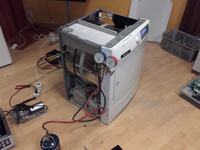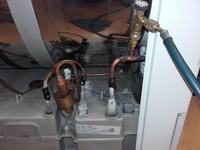Hello,
I am also at the stage of buying a dryer and my type is an ordinary condenser or condenser with a heat pump, which is probably not a surprise to anyone. For now, choosing a company is a secondary matter. The purchase price and possibly the lack of a heat pump, which can break down and is expensive to repair (based on the entry of the predecessor), speak for the usual condensation, but the question arises how much such a dryer heats the room (how much heat it gives off), because when it comes to winter it's not really a problem, but on hot summer days ...? Can anyone comment on this? The energy efficiency class at level B is also not great.
On the other hand, a condenser dryer with a heat pump is of course more expensive, but consumes half as much energy (I compared the Bosch WTB86201PL and WTW85560PL models) and I do not agree with the predecessor that the difference is small and will pay off after 10 years. The heat pump model consumes (for the sake of simplicity I assume that twice as much energy, because in fact even less, 2.12 kWh compared to 4.61 kWh), so assuming that the dryer is to work, let's assume 5 times a week, i.e. 260 times a year (and for me probably even more often because the family 2 + 3), for one year, the energy consumption is 551 kWh for a dryer with a pump up to 1102 kWh for a dryer without a pump (I assumed 4.24 kWh for one cycle). As you can see, the difference in energy consumption, assuming that the average price of 1kWh is PLN 0.55, is as much as PLN 303 for one year, so if the compared condenser dryer costs PLN 1770 (source CENEO) and a condenser dryer with a heat pump costs PLN 2740, according to my calculations payback time is 3 years, not 10 years. Unless there is an error in the course of reasoning somewhere, I am asking for a correction.
But that's not what I meant, because I can get over an ordinary condenser dryer with energy efficiency class B, if the heat pumps are not yet a refined element in the dryers and it is supposed to break down right after the warranty, but I can not imagine the eternal heat in bathroom (there is supposed to be a dryer there), if such dryers give off much heat.
I would like a comment from a person who has a dryer as it actually looks.
Best regards and prosperity in 2015.




